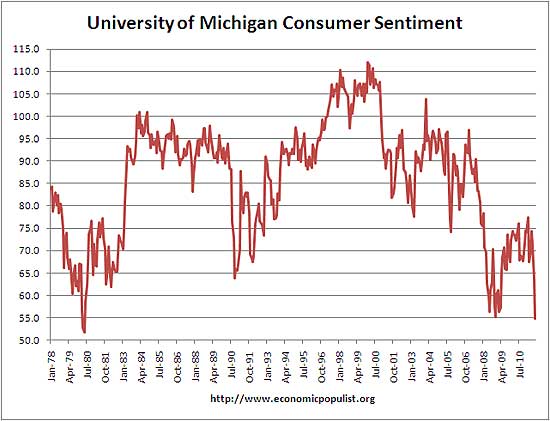The University of Michigan Consumer Sentiment index hit a new low, 54.9. The headlines blare it's the lowest since 1980. That's true, the index hit 51.7 in May of 1980, but the reality is the index is only slightly lower than November 2008, when sentiment hit 55.3.

Reuters and the University of Michigan refuse to publicly release the data for the past 6 months. The below graph was reconstructed from digging around in press releases.

Potential reasons for the plunge are the never ending budget insanity. The survey was taken during the debt ceiling political theater, and when GDP was revised downward. That said, the second quarter already showed the U.S. consumer is D.O.A., job opportunities are almost non-existent and the stock market started to tank.
Two-thirds of all consumers reported that the economy had recently worsened, and just one-in-five anticipated any gains during the year ahead.
Three quarters of respondents expected bad economic times, just below the all-time peak of 82 percent in 1980.
Consumer buying plans fell back to their recession lows, and 46 percent of respondents said they expected unemployment to rise.
The survey's barometer of current economic conditions was 69.3 in August, down from 75.8 in July and below a forecast of 74.3.
The one-year inflation expectation remained stuck at 3.4 percent, while the five-to-10-year inflation outlook also flatlined at 2.9 percent in August.
The expectations barometer for August dropped to 45.7 from 56 in July, and the gauge of current economic conditions fell to 69.3 from 75.8. One-year inflation expectations remained at 3.4%.
We're covering this index in part, out of spite, and in part to show the headline blaze is misleading. One can only determine the headline of lowest since 1980 is slightly misleading by examining the actual index data. It's pretty ridiculous to run a supposed economic indicator index and keep even the basic data secret, forcing people to pay for even the index data, all the while publishing it monthly as a major economic indicator release.
Other sites are also extracting data and graphing it.

"but the reality is the index
"but the reality is the index is only slightly lower than November 2008"
OHHHHH!!!! WOWZERS!!! That totally makes me feel so much better about the economy. Good job Kronkite!
more you should take out of it
November 2008 was right after Financial Armageddon and corporations fired people right and left. It was worse than 1980 and 1980 was pretty bad.
so what
the bottom 90% of the population can go to hell, but the top 10%, controlling 93% of the wealth, will keep the gross aggregate numbers rising all by themselves...the rest of us are just economic baggage; we are no longer needed or wanted as consumers....
Negativity justified but more to it than that
I understand the gist of the comment, and I approve. if you're not angry, you gotta be brain-dead. And that's the trick -- to remain conscious and non-brain-dead, you need to keep expressing yourself in ways that tend to wake up the sleeping sheeple. Even in the bottom 1%. Never abandon your sense of humor!
Check out the Friday Movies Night for 1 July 2011
Even if you live within that privileged 10%, you may be interested in a recovery leading to financial and social stability in your country ... assuming of course that the U.S.A. is your country -- where you have lived and plan on living.
The choice even for the fortunate 10% may be between a restoration of democracy, including an educated middle-class with primary loyalty to the country, or, a corrupt military dictatorship. Concentration of power in a military dictatorship too often knows no bounds and ultimately means concentration of wealth through confiscation of assets -- and that means confiscation of those assets that lie within the 93% owned by the fortunate 10%.
From the top .0001 of 1 %